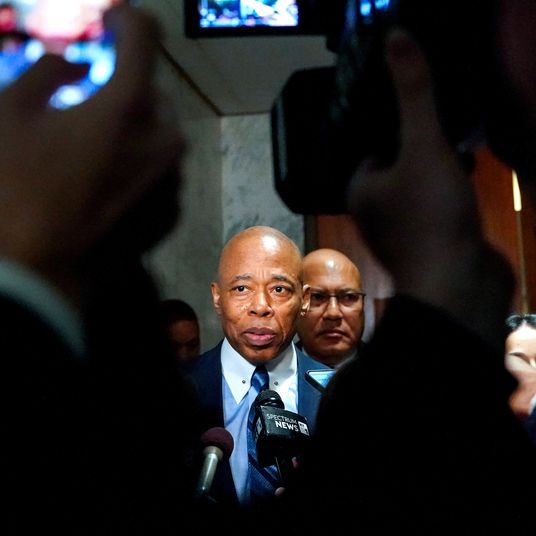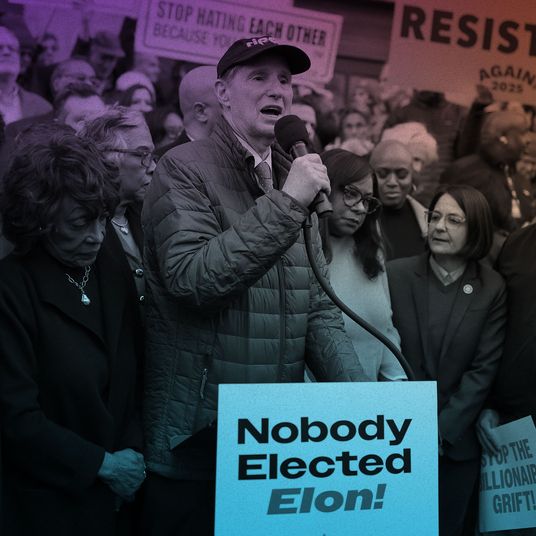
At her press conference Monday, White House press secretary Sarah Sanders reassured the public about the issue that has become the Republicans’ premier campaign liability. “The president’s health-care plan that he’s laid out,” she said, “covers preexisting conditions.”
There are several lies embedded in this statement, beginning with the premise that Trump has a plan at all. Trump ran for president promising repeatedly he would cover everybody, and then confessed, “Nobody knew health care could be so complicated.” He never came up with a plan that would cover everybody, or anything close to it. Republicans in both chambers devised plans that would cut health-care coverage and expose more poor or sick people to higher costs, or make access to medical care completely unaffordable. When the Senate failed to pass anything, the legislative initiative died.
Neither chamber of Congress has any plan to move forward with regard to health care. If Trump has such a plan, he has kept it completely secret.
Second, Trump has made a series of administrative changes designed to cripple Obamacare in general and specifically its ability to deliver affordable coverage to people with preexisting conditions. Republicans in Congress and Trump repealed the individual mandate in their tax-cut bill. (“We ripped the heart out of Obamacare with the individual mandate,” Trump boasted.) Second, he denied payments owed to insurers under the law, in order to prod some of them to exit the markets. Third, his administration flouted the law’s protections by allowing insurers to sell low-cost, bare-bones plans to healthy people, which can be sold at cheap rates because they exclude coverage for medical care needed by people with preexisting conditions.
Trump’s stated rationale for these moves was that he was destroying Obamacare (“It’s dead, it’s gone”) which would then pave the way for something he would like. (“We have essentially repealed Obamacare, and will come up with something that’s much better, whether it’s block grants or whether it’s taking what we have and doing something terrific.” At the time Trump and his allies were trying to repeal the law, the uncertainty caused by their actions made premiums skyrocket, and the failure of that repeal meant rates were higher than insurers needed to run a profit. They have come back down, but not as low as they would be if not for the sabotage.
These attempts to sabotage Obamacare did not destroy the law. Instead they merely hampered it, by luring healthy customers out of the exchanges, leaving behind a sicker population, resulting in higher premiums. A new Kaiser Family Foundation analysis finds that premiums are 16 percent higher as a result of Trump’s combined sabotage attempts.
Finally, and most absurd of all, in place of a “plan,” the administration really does have a concrete course of action on health care. It’s a lawsuit to overturn federal regulations protecting people with preexisting conditions. The law, the true centerpiece of the Affordable Care Act, prevents insurers from either charging higher prices to people with preexisting conditions or denying coverage for treatments they need.
Republican attorneys general in 20 states, joined by the Trump administration, are supporting an outlandish lawsuit to eliminate these protections. Their case rests on the fact that they originally envisioned having an individual mandate, and since Congress repealed the individual mandate, the protections for preexisting conditions should also be repealed. The legal absurdity of this argument can be seen simply by noting that, if Congress actually meant to repeal the insurance regulations when it eliminated the individual mandate, it would have said something to this effect at the time. It didn’t.
In any case, Trump’s “plan” for health care is a lawsuit to deny protections for people with preexisting conditions. This is the opposite of having a plan to protect people with preexisting conditions.
Republicans are doing this both because they viscerally despise Obamacare and because they ideologically believe the government should not regulate the insurance market. But their position is wildly unpopular. The dynamics of competitive democracy suggest Republicans should be forced to abandon a policy position that they cannot defend to the electorate. Instead they are obscuring their stance with wild lies without altering its substance whatsoever. Whether they succeed in doing so poses an important test for the democratic process.






























